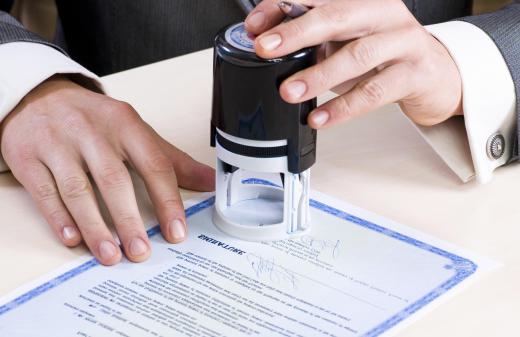At MyLawQuestions, we're committed to delivering accurate, trustworthy information. Our expert-authored content is rigorously fact-checked and sourced from credible authorities. Discover how we uphold the highest standards in providing you with reliable knowledge.
What is a Summons and Complaint?
A summons and complaint is a set of legal paperwork used to start a lawsuit in some countries. In general, the summons serves to notify the defendant that he or she is being sued in a particular court. The complaint usually details any claims that a plaintiff is making against a defendant as well as the type of judgment being sought. Most jurisdictions require both documents to comply with certain procedural rules in order to be valid.
In some countries, a summons is also called a claims form. As a general rule, a summons includes the names and addresses of the parties to the suit as well as the court’s contact details. In addition, it usually indicates the date by which the defendant must respond to the complaint. This response is typically referred to as an answer, and it generally needs to address each of the allegations made in the complaint. If a defendant fails to respond to the complaint by the date listed on the summons, he or she may risk the court entering a default judgment in favor of the plaintiff.

Usually, a complaint is more detailed than a summons. It typically spells out the reason that a case has been filed in a particular court. Additionally, a complaint generally contains a short statement of facts as well as a description of the legal theories on which the case is based. For instance, the complaint may state that the case is being filed for breach of contract, malpractice, or negligence. Finally, complaints ordinarily include a demand statement that spells out the type of relief being sought by the plaintiff.

A plaintiff is customarily required to sign a summons and complaint before serving them on a defendant. Frequently, the plaintiff is also required to have the documents notarized or verified in front of a court clerk. In signing the documents, the plaintiff is essentially pledging to the court that he or she has a legitimate, good faith reason for bringing the suit against the defendant.

In order to be valid, a summons and complaint must be properly served on a defendant, an event that is often referred to as service of process. Failure to correctly conduct service of process may result in the court being unable to hear the case. The rules for serving a summons and complaint on a defendant vary from jurisdiction to jurisdiction. If there are multiple defendants to a case, each defendant is usually given a copy of the summons and complaint. Generally, the service of process must be conducted by an adult who is not a party to the lawsuit.
AS FEATURED ON:
AS FEATURED ON:













Discussion Comments
@Markus – That’s not true in every Jurisdiction. My sister hand delivered the summons to her husband herself in their divorce. You’re allowed to do that in her county as long as it’s uncontested and you know where they are. The judge accepted it with no questions asked and they were divorced a few weeks later.
I think it's important to stress how the process server not being someone associated with the case, because a lot of times they get blamed or even threatened by people. I know because my dad used to serve summons, and people used to say the craziest things to him.
Just to make it super-clear, this person is usually appointed from the county court or a member of the Sheriff’s Department. Not just anyone is allowed to serve official court documents.
Post your comments